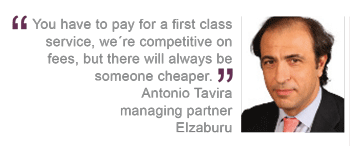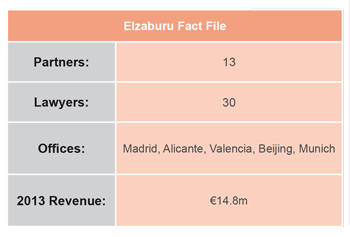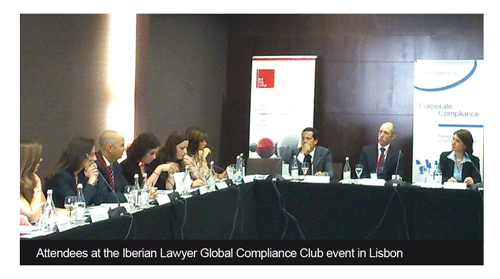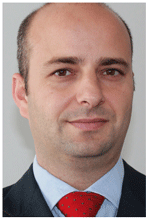Paying the price – Elzaburu
Specialist intellectual property firm Elzaburu recently topped a table ranking law firms according to revenue per lawyer. However, behind the impressive figures lies the story of a firm looking to reposition itself in an increasingly competitive market
Which law firm recently topped a ranking of firms in Spain with the largest revenue per lawyer? You could be forgiven for thinking it was one of the massive global firms such as Clifford Chance or Linklaters, or one of the Spanish heavyweights like Uría Menéndez, but you´d be wrong. It was actually the Madrid-based intellectual property (IP) firm Elzaburu.
The ranking – published by Expansión – showed that Elzaburu has a revenue per lawyer of €510,000. This was based on a 2013 revenue of €14.8m. In fairness, Antonio Tavira, managing partner of Elzaburu, acknowledges that the revenue per lawyer figure distorts the picture somewhat. The firm has 30 lawyers – of which 13 are partners – but also 15 patent attorneys. Consequently, Tavira says the firm has 45 fee-earners in total, but also five other “professionals”, including the financial director, for example, as well as around 160 back office staff who carry out administrative tasks such as processing and maintaining files.
Worth every penny
While a true picture of the firm´s headcount may make the revenue figure look less impressive, Elzaburu still has a formidable reputation for its IP work. As one IP lawyer at a rival firm says: “I´ve had unhappy IP clients coming to me from most other firms (because they were unhappy with the service), but never from Elzaburu – they are very high-priced, but they´re worth it.” The lawyer adds that the reason why the firm generates so much revenue is that it works for a lot of foreign companies that are “used to higher fees”.
But Tavira argues that, while foreign companies used to pay higher fees, it is no longer the case. “International clients were paying higher fees, now the fees paid by Spanish companies are the same.” Tavira adds that due to the economic crisis, clients have restricted budgets. “There is less activity in trademarks, patents and litigation – we have not increased our fees for eight years, in fact, we have lowered our fees, partly because we have brought about a huge improvement in our data processing.” Tavira also says that the firm is winning lots of public tenders, which, he argues, wouldn´t be the case if the firm´s rates were expensive.

However, Tavira acknowledges that Elzaburu is not the cheapest firm for IP work. “You have to pay for a first class service, we´re competitive on fees, but there will always be someone cheaper,” he says. “But people will pay more for having confidence in the firm who gives them service – we have had some clients for 40 or 50 years.” Around 70-75 per cent of the firm´s clients are international, with Spanish clients making up the remaining portion. Confidentiality agreements forbid Tavira from naming the firm´s biggest clients, though it is believed that the firm does IP work for Disney and General Electric among others. Tavira says that Elzaburu used to handle IP matters for the majority of US clients in Spain, but that changed with the creation of the Office for Harmonization in the Internal Market (OHIM), which provides companies with exclusive rights for trademark and design protection throughout the European Union (EU) with just a single application. “It´s much easier to ren
ew trademarks now and there is much more competition,” Tavira says.
One-stop shop
This increasingly competitive market – along with downward pressure on fees – has had an impact on Elzaburu´s revenue, which dropped 9.2 per cent in 2013 down from €16.3m the previous year. So how is the firm reacting to the decrease in revenue? Tavira says that the only way for the firm to keep growing is to focus on expanding in the Spanish market. “We seek to be considered a top European firm based in Spain, we need to show ourselves as a unique international IP firm in that we give advice, we do filing, we do post filing advice, we do litigation and we do contracts. You get good firms doing only filing, only litigation, or only legal advice, but it is only us in Spain who do all these things, we are a one-stop shop.” Portraying this image in the Spanish market could be one of the areas where the firm has fallen short – one IP lawyer at a rival firm, who rates Elzaburu highly, says: “I know them as an IP agency, they probably do contracts and IP litigation, but I don´t know about it.” Tavira says that Elzaburu has 12 litigators and around 20 per cent of the firm´s revenue is generated by litigious work.
According to Tavira, the intellectual property business is becoming more difficult for law firms. “With regard to
patents, there is huge competition with regard to validations and translations, we have to ensure we add value.” And how does Elzaburu do that? “We have to have the best attorneys as there are more firms coming into the market and more firms focused on volume.”
Elzaburu managed to reduce its expenses in the last year by around 10 to 15 per cent, Tavira says. This was achieved by outsourcing functions such as its data centre as well as its internal printing and scanning, which means the firm now pays “per use”. These savings have been passed on to the firm´s clients in the form of reduced rates, Tavira claims. “The savings have translated to fees,” he says.
Traumatic cuts
Back in 2010, the firm was forced to substantially reduce its number of back office staff due to declining revenue. The 20 per cent drop in headcount meant that the size of the back office team was reduced to around 160. “It was traumatic,” Tavira says. “With the drop in revenue last year, will there be further staff cuts? We now have the right number, we still need people and we won´t need to reduce this much more in future.” Tavira acknowledges that Elzaburu´s business model is an expensive one. “All our people in contact with clients are attorneys, not paralegals, quality control is a must – any problem always goes to the quality committee, it always goes to the top people, we try to solve the problem immediately.” Indeed, clients praise the firm´s team of lawyers. Rosalía Salvia, IP manager at pharmaceutical company ISDIN says: “We would recommend the firm for its flexibility and good team.”
In an effort to boost its Chinese business, Elzaburu opened an office in Beijing in February this year. Tavira points out that is a representative office, rather than a filing office, but that the aim is to get closer to Chinese clients. “We´re not filing in China, we do that through preferred Chinese firms – we´re advising Spanish clients there, though we do not get a large proportion of our revenue from China, but six or seven years ago, we had no revenue from there.” Tavira adds that Asia is a very important region for the firm: “We get a lot of business from Japan, around four to five percent – but we want to compete with the German [Elzaburu has a non-filing office in Munich] and British firms, they get most of the Asian clients.”
Tavira says a lot of the firm´s efforts will be channelled into strengthen
ing its position in the Spanish market. “We will continue hiring the best IP professionals,” Tavira says. “We are continually interviewing and people will be hired in the coming year.” Will this include lateral hires? “Our policy is not to hire from other firms – our policy when we contact headhunters is that potential hires cannot be working for other firms – this has worked well, so why change? We are well respected in the market.”
Elzaburu places considerable emphasis on preserving the firm´s culture, according to Tavira. “We always try to get the same type of people – we don´t have individuals, we have teams, whenever we go away together as a group we always have a good time – one attorney who joined us said, and these are his words, not mine, ‘it´s impressive the quality of the people who advise the clients’.”












